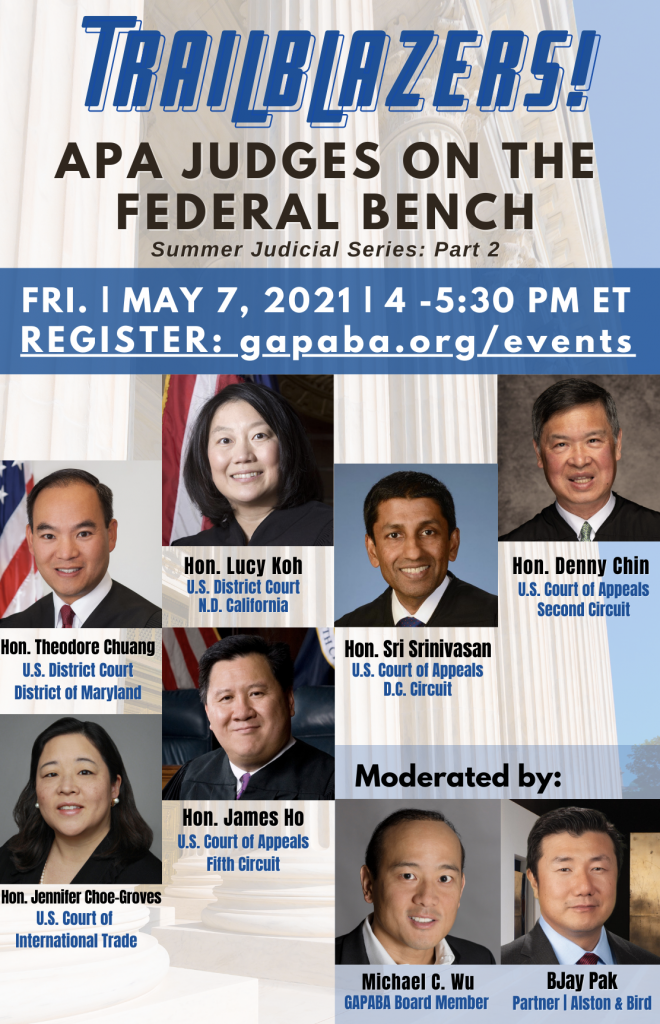For Immediate Release
Jan. 26, 2017
WASHINGTON — The National Asian Pacific American Bar Association (NAPABA) and the South Asian Bar Association of North America (SABA) condemn the anti-immigrant and xenophobic Executive Orders issued yesterday by President Trump. Notably, the orders (1) revive the “Secure Communities” immigration enforcement program, which was previously criticized for promoting racial profiling by local law enforcement officials who were required to enforce federal immigration laws, (2) implement policies that may result in the deportation of tens of thousands of undocumented immigrants who pose no threat to the American people, and (3) strip federal funding from “sanctuary cities,” that protect countless immigrants and their families by refusing to prosecute residents for violations of federal immigration laws.
The policies announced yesterday encourage racial and religious profiling and almost exclusively target communities of color. There are 1.3 million undocumented Asian Pacific Americans, including those brought to the United States as children, whose families will be directly affected by these orders. In recent months, Arab, Middle Eastern, Muslim, Sikh, and South Asian Americans have been the targets of more hate incidents and violence than at any time since the immediate aftermath of Sept. 11 — with a noticeable increase in anti-immigrant bias. These Executive Orders that breed distrust of immigrants will only serve to make our communities less safe.
“Actions like the President’s executive orders have been shown in the past to discourage victims from reporting crimes to law enforcement officials because of fear of prosecution based on immigration status and threatens the years of progress we have made towards creating safer communities,” said NAPABA President Cyndie Chang. “As attorneys, we are committed to ensuring that all persons in the United States have equal access to justice and the ability to seek assistance from law enforcement without fear of reprisal or harm.”
“The President’s actions demonize and stigmatize groups of people and further the divisions in our country, while reinforcing the fear and distrust permeating our communities,” stated Vichal Kumar, president of SABA. “With the stroke of a pen, these divisive actions have caused grave uncertainty, shock and grief amongst our must vulnerable. We must continue to provide safety and security for our communities and not allow these divisive actions to further tear us part.”
These orders, along with the reportedly forthcoming executive actions to restrict immigration based on nationality and religion and to close our borders to refugees, represent a rejection of our core values as a country, which has always welcomed those who have been forced to flee their homes to escape conflict or persecution. These actions also represent a step backwards in decades-long efforts to create trust between law enforcement agencies, immigrant communities, and the broader American public — which is a critical component of public safety for all Americans.
Sanctuary policies promote positive relationships between law enforcement and immigrant communities and studies indicate they have not led to increases in crime. Local jurisdictions have enacted these policies to encourage victims and witnesses of crimes to step forward as a matter of public safety. Threatening funding for such jurisdictions may jeopardize the effective operation of our legal system and public safety for all Americans.
The orders further criminalize immigrant communities and will lead to an increase in detention and deportation. The orders expand enforcement priorities to include anyone convicted of any crime, without respect to the seriousness of the crime, and those who are not charged with a crime. Further, Secure Communities led to an increase in racial and national origin profiling by law enforcement resulting in thousands of U.S. citizens being detained.
Immigrant communities and their families contribute to our nation, regardless of origin or status. As attorneys whose families come from a wide range of immigrant and religious backgrounds, we understand that these policies will not make us safer or unite us as a country and NAPABA and SABA will continue to stand up for the rights of immigrants and religious minorities. We encourage our members and all members of the legal community to join us to stand up for the rights of our communities.
For more information, contact:
Brett Schuster
Communications Manager
NAPABA
(202) 775-9555
bschuster@napaba.org
Aneesh Mehta
Vice President of Public Relations
SABA North America
(770) 316-9018
publicrelations@sabanorthamerica.com
NAPABA is the national association of Asian Pacific American attorneys, judges, law professors, and law students. NAPABA represents the interests of over 50,000 attorneys and over 75 national, state, and local bar associations. Its members include solo practitioners, large firm lawyers, corporate counsel, legal services and non-profit attorneys, and lawyers serving at all levels of government. NAPABA engages in legislative and policy advocacy, promotes APA political leadership and political appointments, and builds coalitions within the legal profession and the community at large. NAPABA also serves as a resource for government agencies, members of Congress, and public service organizations about APAs in the legal profession, civil rights, and diversity in the courts.
SABA North America (formerly NASABA/North American South Asian Bar Association) is a voluntary bar organization and serves as an umbrella organization to 26 chapters in the United States and Canada. SABA North America is a recognized forum for professional growth and advancement for South Asian attorneys in North America and seeks to protect the rights and liberties of the South Asian community across the continent. Learn more at www.sabanorthamerica.com.


